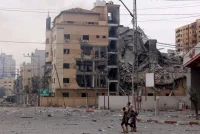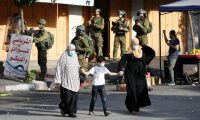
Causes for Despair
We were waiting for the plumbers who had promised to come early on Saturday morning to our house in Ramallah when the news broke of Hamas’s surprise attack against Israel. When they arrived they were a team of two. The younger couldn’t stop watching the video clips Hamas was posting. I could see him smile every time a new one arrived of Palestinian gunmen tearing down the walls and gates that have hemmed in Gaza for the last sixteen years. There’s an inevitable euphoria as the imprisoned anywhere break their chains and escape their incarceration.
The eldest was more somber and able to concentrate on his work.… Seguir leyendo »








